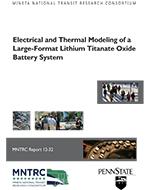Abstract:
The future of mass transportation is clearly moving towards the increased efficiency of hybrid and electric vehicles. Electrical energy storage is a key component in most of these advanced vehicles, with the system complexity and vehicle cost shifting from combustion engines to battery and electric drive systems.
To assist engineers and technicians in this transfer, the Battery Application Technology Testing and Energy Research Laboratory (BATTERY) of the Thomas D. Larson Pennsylvania Transportation Institute in the College of Engineering at The Pennsylvania State University partnered with an advanced bus manufacturer to study lithium titanate oxide battery chemistry for use in transit buses. The research team found, other than proprietary data/models, scant technical information or research on electrical and thermal modeling of this advanced chemistry.
The research team developed lithium titanate oxide modules to study their characteristic behaviors and produce state-of-charge estimators capable of running on the limited embedded processing power and memory of a typical battery management system. The team also investigated the thermal performance of this chemistry in the large format, producing a physics-based empirical thermal model for use in system-level simulations. This model predicts pack-level thermal behavior by reporting the minimum, maximum, and average temperatures within a system typically used for large automotive applications, as testing was concentrated on transit bus usage profiles.
This work supports battery system integration and management. The tools produced are intended to assist automotive engineers to achieve optimal system performance and ultimately a more efficient vehicle.
Publications:
Authors:
TIMOTHY CLEARY, M.S.
Timothy Cleary is the director of the Battery Application Technology Testing & Energy Research Laboratory (BATTERY) at the Larson Institute at Pennsylvania State University.
Mr. Cleary earned his B.Sc. and M.S. degrees in mechanical engineering from Penn State. He was involved in the U.S. DOE-sponsored Advanced Vehicle competitions for five years, culminating in his service as team leader for the 2007-2008 competition. In 2009- 2010, he was a vehicle systems and simulation contracted engineer supporting U.S. DOE research in pluggable hybrid electric vehicles. In 2010-2011 he gained Top Secret security clearance and assisted the U.S. Army’s Seeker Effects Laboratory in performing infrared countermeasure testing. He concentrates his research in battery system development and application testing for advance chemistry automotive batteries ranging from starter to full electric buses.
HARSHAD KUNTE, M.S.
Harshad Kunte is a systems design architect engineer for Tesla Motors. He earned a master’s degree in mechanical engineering at Pennsylvania State University in May 2014 with a focus on control systems engineering. His research interests are in battery systems modeling and control, primarily for electric and hybrid vehicles. At Penn State’s Larson Institute, he served the BATTERY Lab as a research assistant and contributed to its extensive work in testing, modeling, and verification of large-format battery systems.
During undergraduate school, he was deeply involved with a team that developed plug-in electric auto cross race cars. He is experienced in working with and leading teams to develop large-format Li-ion battery systems. Recently, he worked with The MathWorks, Inc. as an engineer on the Control Design and Automation team and possesses strong skills in model-based design and systems engineering using MATLAB and Simulink®.
JAMES KREIBICK
James A. Kreibick is a graduate student in electrical engineering at Pennsylvania State University. His interests focus around control systems and power systems. His role in this study included testing setup and data acquisition during battery testing. He has also been actively involved in the Penn State Advanced Vehicle team, including participation in the EcoCAR 2 competition sponsored by General Motors and the Argonne National Laboratory. His role in the team was to improve and develop control algorithms for vehicle development.


